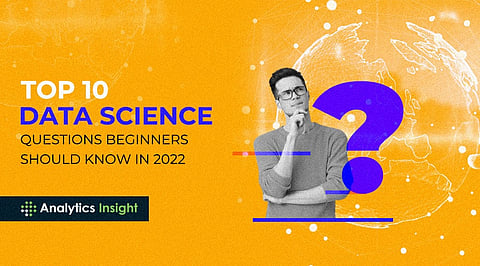
- Insights
- Cryptocurrencies
- Stocks
- White Papers
- Industry
- Geography
- Insights
- Cryptocurrencies
- Stocks
- White Papers
- Industry
- Geography


Data Science is now ruling the world with its diverse applications among various sectors. It's now playing a vital role to gain profits. Many youngsters are showing immense interest in Data Science. Combing AI, ML, and many other technologies Data Scientists are creating wonders and giving results at their best. Data Science questions is not solely about data, but also machine learning, artificial technology, data mining, and big data.
There are many Data Science enthusiasts out there who have any queries regarding what exactly is data science? The beginners have no idea about where to start? From which sources to gather information? And the list goes on. They tend to have many queries which are quite normal. Aspiring to be data scientists might be easy. However, data science is a vast field, and without any groundwork and background, it will be difficult to get into the field. Every field has its own ups and downs so does Data Science questions. To make sure your path is safe and clear, here are a few questions that every data science beginner should know.
Data science is an interdisciplinary field that uses scientific methods, processes, algorithms, and systems to extract knowledge and insights from structured and unstructured data and apply knowledge and actionable insights from data across a broad range of application domains. Data science questions is related to data mining, machine learning, and big data. It is a concept to unify statistics, data analysis, informatics, and their related methods in order to "understand and analyze actual phenomena" with data. It uses techniques and theories drawn from many fields within the context of mathematics, statistics, computer science, information science, and many others.
To become a Data Scientist, there are enormous skills that are required. For instance, knowledge of data visualization tools (Tableau, Qlik, Datameer, etc.), understanding of languages like Python, R, SQL, and database management systems, clarity of Data Analytics concepts like statistics, and deriving the right insights from data.
MATH is an integral part of Data Science. Learning math is very much needed in Data Science. Few common types of math that one should learn are linear algebra, calculus, statistics, probability.
Applications of math in the data science questions domain include Natural language processing, computer vision, marketing, and sales.
Programming Language is a set of instructions or commands used to either write code or to create software programs. Few major types of programming languages are listed as follows.
Procedural Programming Languages, Functional Programming Languages, Object-Oriented Programming Languages, Scripting Programming Languages, Logic Programming.
Discover at what scale your organization is using data science. This will help you determine what languages to learn, as well as how you should learn to use them.
Few major programming languages include Python, Java, JavaScript, C, C++, MATLAB, SQL, etc.
One should need to know statistics in order to get a data science job. Few types of statistics that all should learn include descriptive Statistics (mean, median, mode, variance, standard deviation), Inferential Statistics (hypothesis testing, z test, t-test, significance level, p-value), and Statistical analysis (linear regression, forecasting, logistic regress).
Statistics play a major role in identifying the importance of features by using various statistical tests. It finds the relationship between features to eliminate the possibility of duplicate features. Statistics converts the features into the required format. Normalizing and scaling the data. This step also involves the identification of the distribution of data and the nature of data. Taking the data for further processing by using required adjustments in the data science questions and many others.
There are many courses available under the Data Science questions Domain such as,
Some of the major job opportunities that any youngster can explore in this stream are data scientist, data engineer, data analyst, machine learning engineer, data journalist, database admin, financial analyst, business analyst, product analyst, business intelligence analyst, marketing analyst, quantitative analyst, data visualization specialist, functional analyst, data system developer, etc.
Model Deployment where you have made the complete data science project. It is time for the intended user/ stakeholder to reap the benefits of the predictive power of your machine learning model. In simple words, this is model deployment. This is one of the most important steps from a business point of view but also the least taught one.
Data Science is now dominating every field across the globe. There is no industry in the world today that does not use data There are various industries like banking, finance, manufacturing, transport, e-commerce, education, etc. that use data science questions.
According to the report by IBM, Data Analytics career opportunities in the US alone will increase to around 2 million in 2020 and the average yearly pay of a Data Scientist or Analyst will range from $1,05,000 to $1,17,000. By this we can see a there's a huge scope for people out there who are interested in data science questions.
